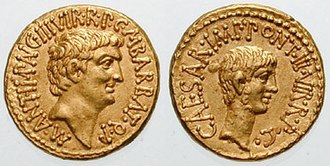Mark Antony
- For the American singer, see Marc Anthony.
Mark Antony (Latin: Marcus Antonius, 14 January circa 82 BC – 1 August 30 BC),[1] was a Roman patrician from an upper-class family. He became a general and politician. He was an important supporter of Julius Caesar as a military commander and administrator.
Enemy of the state, and the second triumvirate

After Caesar's assassination, Antony, left as sole Consul, surrounded himself with a bodyguard of Caesar's veterans. He forced the senate to transfer to him the province of Cisalpine Gaul,[3] at the time administered by Brutus, one of the conspirators. Brutus refused to surrender the province and Antony set out to attack him in the beginning of 43 BC, besieging him at Mutina.
Encouraged by Cicero, the Senate denounced Antony. In January 43 they granted Octavian imperium (commanding power), and sent him to relieve the siege. In April 43, Antony's forces were defeated at the battles of Forum Gallorum and Mutina, forcing Antony to retreat to Transalpine Gaul.
News came that Brutus and Cassius were assembling an army in order to march on Rome. Antony, Octavian and Lepidus joined as allies, in November 43 BC, to stop Caesar's assassins. The trio were the Second Triumvirate. Brutus and Cassius were defeated by Antony and Octavian at the Battle of Philippi in October 42 BC. After the battle, a new arrangement was made: while Octavian returned to Rome, Antony went on to govern the east of the Republic. Lepidus went to govern Hispania (Spain) and the province of Africa. The triumvirate's enemies were subjected to proscription, including Mark Antony's archenemy Cicero, who was killed on 7 December 43 BC.[4]
Egypt
Antony followed in Caesar's footsteps by going to Egypt and becoming Cleopatra's lover. They had three children together. His absence from Rome allowed the intelligent Octavian to build up support.
The triumvirate broke up in 33 BC, and disagreement turned to civil war in 31 BC. Antony was defeated by Octavian at the naval Battle of Actium and then at Alexandria. He committed suicide, as did his lover, Cleopatra VII of Egypt, in 30 BC.
William Shakespeare wrote a play "Antony and Cleopatra" based on this historical event.
Mark Antony Media
- Lucius Antonius.jpg
Coin of Lucius Antonius, the youngest brother of Marc Antony, and Consul in 41 BC. Ephesus mint, 41 BC
The ancient Mediterranean in 50 BC at the end of Caesar's Gallic Wars, with the territory of Rome in yellow.
Cato the Younger was one of Caesar's chief opponents before the outbreak of the civil war.
The Battle of Pharsalus: the decisive battle of Caesar's Civil War. Antony commanded the left wing of Caesar's army.
The Death of Julius Caesar, as depicted by Vincenzo Camuccini. Caesar was assassinated on the Ides of March (15 March) 44 BC.
Octavian, Julius Caesar's adopted son. Antony would struggle with Octavian for leadership of the Caesarians after Caesar's assassination.
"Marc Antony's Oration at Caesar's Funeral" as depicted by George Edward Robertson.
References
- ↑ full name: Marcus Antonius Marci Filius Marci Nepos; in English, "Marcus Antonius, son of Marcus, grandson of Marcus".
- ↑ Sear, David R. "Common legend abbreviations on Roman coins". Retrieved 2007-08-24.
- ↑ Part of Gaul on the Italian side of the Alps
- ↑ Proscription: public identification and official condemnation of enemies of the state. Proscription implies the elimination (by death or banishment) of political rivals
| Wikimedia Commons has media related to Lua error in Module:Commons_link at line 62: attempt to index field 'wikibase' (a nil value).. |

